Author: dorner
Resource: Brill’s Medieval Reference Library Online
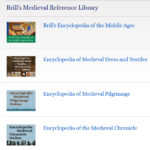 The Library has recently acquired Brill’s Medieval Reference Library Online. This includes:
The Library has recently acquired Brill’s Medieval Reference Library Online. This includes:
Brill’s Encyclopedia of the Middle Ages, an English translation of the second edition (2013) of the well-known German-language Enzyklopädie des Mittelalters, published by Primus Verlag / Wissenschaftliche Buchgesellschaft.
Encyclopedia of Medieval Dress and Textiles, a unique work bringing together the latest research from across many disciplines that contribute to our knowledge of medieval dress and textiles.
Encyclopedia of Medieval Pilgrimage, an interdisciplinary reference work, giving wide coverage of the role of travel in medieval religious life.
Encyclopedia of the Medieval Chronicle, a resource offering the latest research in chronicle studies from a variety of disciplines and scholarly traditions
Resource: International African Bibliography Online
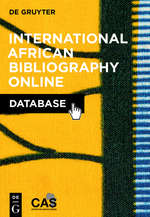 The Library has recently acquired the International African Bibliography Online, a “leading specialist bibliography of African Studies,” published by De Gruyter, in cooperation with the Center for African Studies, University of Cape Town, South Africa. It contains over 140,000 entries that were published in the print edition, published in the years 1971 to 2016, and will be updated four times a year, with approximately 4,000 entries each year.
The Library has recently acquired the International African Bibliography Online, a “leading specialist bibliography of African Studies,” published by De Gruyter, in cooperation with the Center for African Studies, University of Cape Town, South Africa. It contains over 140,000 entries that were published in the print edition, published in the years 1971 to 2016, and will be updated four times a year, with approximately 4,000 entries each year.
The resource is searchable by author, editor, title, publication year, ISSN/ISBN, keyword, full text and categories like regions and countries.
Workshops: Digital Publishing
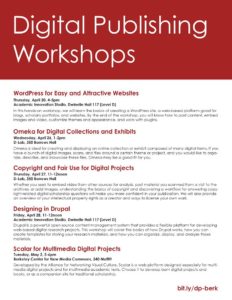 Whether you are looking to create a companion website for your book or a full-scale digital project, this workshop series is designed to get you up and running with the user-friendly, open source web publishing platforms Scalar, WordPress, Omeka and Drupal.
Whether you are looking to create a companion website for your book or a full-scale digital project, this workshop series is designed to get you up and running with the user-friendly, open source web publishing platforms Scalar, WordPress, Omeka and Drupal.
- All platforms are easily managed right through your web browser.
- No programming or coding knowledge is required.
- Options for hosting will be covered.
- Technology workshops will be hands-on; bring a laptop if you can.
This series is designed for faculty, graduate students, and staff in the Humanities and Social Sciences and is open to any member of the UC Berkeley community. Register at bit.ly/dp-berk
WordPress for Easy and Attractive Websites
Thursday, April 20, 4-5pm
Academic Innovation Studio, Dwinelle Hall 117 (Level D)
In this hands-on workshop, we will learn the basics of creating a WordPress site, a web-based platform good for blogs, scholarly portfolios, and websites. By the end of the workshop, you will know how to post content, embed images and video, customize themes and appearance, and work with plugins.
Register
Omeka for Digital Collections and Exhibits
Wednesday, April 26, 1-2pm
D-Lab, 350 Barrows Hall
Omeka is ideal for creating and displaying an online collection or exhibit composed of many digital items. If you have a bunch of digital images, scans, and files around a certain theme or project, and you would like to organize, describe, and showcase these files, Omeka may be a good fit for you. In this hands-on workshop, we will learn how to add and describe items in Omeka, the basics of the Dublin Core metadata schema, and how to create webpages with the Simple Pages plugin.
Register
Copyright and Fair Use for Digital Projects
Thursday, April 27, 11-12noon
D-Lab, 350 Barrows Hall
This training will help you navigate the copyright, fair use, and usage rights of including third-party content in your digital project. Whether you seek to embed video from other sources for analysis, post material you scanned from a visit to the archives, add images, upload documents, or more, understanding the basics of copyright and discovering a workflow for answering copyright-related digital scholarship questions will make you more confident in your publication. We will also provide an overview of your intellectual property rights as a creator and ways to license your own work.
Designing in Drupal
Friday, April 28, 11-12noon
Academic Innovation Studio, Dwinelle Hall 117 (Level D)
Drupal is a powerful open source content management system that provides a flexible platform for developing web-based digital research projects. This workshop will cover the basics of how Drupal works, how you can create templates for storing your research materials, and how you can organize, display, and analyze those materials. Drupal is a good choice for many kinds of projects, including websites and projects underpinned by a database.
Scalar for Multimedia Digital Projects
Tuesday, May 2, 5-6pm
Berkeley Center for New Media Commons, 340 Moffitt
Developed by the Alliance for Networking Visual Culture, Scalar is a web platform designed especially for multimedia digital projects and for multimedia academic texts. Like WordPress, it is easy to create content, but it is distinguished by multiple ways of navigating through a project, annotation and metadata features, and image and video options. Choose it to develop born digital projects and books, or as a companion site for traditional scholarship. In this hands-on workshop, we’ll learn how to create a Scalar project, create pages and media, add metadata and annotations, and define paths.
Register at bit.ly/dp-berk
Event- Maps and More: Sugar and Sand: Tracing Cuba’s Shifting Export Economy in Maps
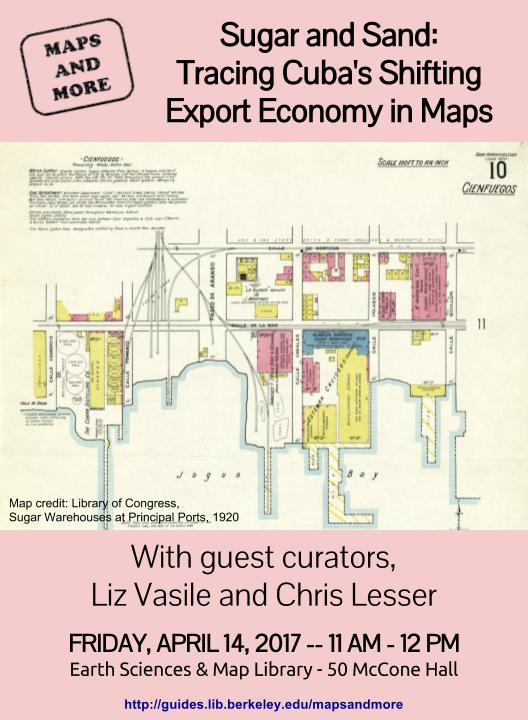
Primary Sources: The Archives of the Church in North India: Archival Collection
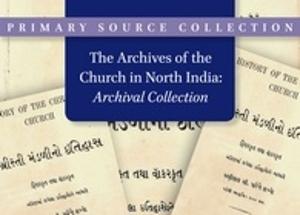 The recently acquired collection of The Archives of the Church in North India: Archival Collection is described on their website as follows: “A collaboration with Yale University, the online version of The Archives of the Church in North India comprises archival and printed material from the Gujarat Diocese of the Church of North India. The Archival collection includes:
The recently acquired collection of The Archives of the Church in North India: Archival Collection is described on their website as follows: “A collaboration with Yale University, the online version of The Archives of the Church in North India comprises archival and printed material from the Gujarat Diocese of the Church of North India. The Archival collection includes:
- Minutes of meetings, correspondence and other documents of the Irish Presbyterian Mission Council in Gujarat and relevant local committees.
- Annual reports prepared by the Irish Presbyterian Mission Council that describe the achievements of the past year, including information about the financial situation of the IP Mission from 1851 to 1965.
- Annual reports of the Missions’ Orphanage from 1870 till 1958.”
Primary Sources: Confidential Print: North America, 1824-1961
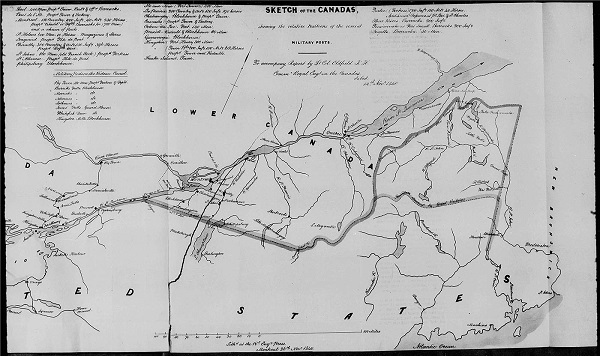
Beginning in the 1820s, the Confidential Print series was a selection of key correspondence, orders, policy documents, treaty texts, and memoranda from Great Britain’s Foreign Office and Colonial Office distributed internally to the Monarchy, Cabinet, members of Parliament, and within their organizations. Confidential Print: North America sheds light on controversies surrounding slavery, the treatment of Canadian indigenous peoples, uprisings against colonial rule, labor unrest in the United states, Nazi and fascist activities in Latin America, and much more. The record groups included in this series of Confidential Print are:
CO 880 War and Colonial Department and Colonial Office: Confidential Print North America, 1939-1914
CO 884 War and Colonial Department and Colonial Office: West Indies, Confidential Print 1826-1961
FO 414 Foreign Office: Confidential Print North America, 1824-1941
FO 461 Foreign Office: Confidential Print America, 1942-1956
FO 462 Foreign Office: Confidential Print United States of America, 1947-1956
More details about the contents of these record groups can be found in the Nature & Scope page of the site.
Primary Sources: Confidential U.S. State Department Central Files, 1960-1969, Africa and the Middle East

The Library has acquired the online resource Confidential U.S. State Department Central Files, 1960-1969, Africa and the Middle East, which includes U.S. State Department Central Files that have not been microfilmed by the National Archives or distributed by other publishers. It contains a wide range of sensitive materials from U.S. diplomats in foreign countries: reports on political, military, and socioeconomic matters; interviews and minutes of meetings with foreign government officials; important letters, instructions, and cables sent and received by U.S. diplomatic personnel; and reports and translations from foreign journals and newspapers.
The Africa files cover the brutal civil war between Biafra and Nigeria in the late 1960s, the 1964 Rivonia trial of Nelson Mandela and seven leaders of the African National Congress, violent protest against the South African government coupled with police crackdowns on the resistance, the troubled relationship between the U.S. and the apartheid regime, and the first years of independence in Ghana and the Congo. The files on Egypt offer considerable detail on the Egyptian political structure which was dominated by Gamal Abdel Nasser in the 1960s. Political issues are also covered in extensive detail in the files on Iran, Iraq, and Israel. Documents on Iran follow Ali Amin’s tenure as prime minister and his succession by Asadollah Alam. In Israel, State Department personnel tracked developments in the Knesset (Israeli Parliament), the political fortunes of important members of the Israeli government, and the fragile security situation faced by Israel. The countries covered in this module are: Biafra/Nigeria; Congo; Egypt; Ghana; South Africa; Iran; Iraq; Israel; Lebanon; Palestine; Saudi Arabia; the Persian Gulf States (Aden, Bahrein, Kuwait, Muscat & Oman, Qatar, Trucial Sheiks); and Yemen.
Trial: Cuban Culture and Cultural Relations, 1959-: The Vertical Archive of the Casa de las Américas, Part 1: “Casa y Cultura”
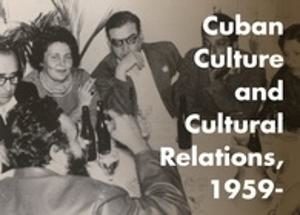 The Library has a trial until April 21 of Cuban Culture and Cultural Relations, 1959-: The Vertical Archive of the Casa de las Américas, Part 1: “Casa y Cultura”. According to the publisher, this unique primary source collection consists of about 45,000 searchable documents from the Casa de las Américas in Havana, documenting over 60 years of the culture and cultural relations of Revolutionary Cuba and countries in Latin America and the Caribbean. This archive is organized into 545 folders, covering such diverse materials as articles, newspaper clippings, cable messages, interviews, conference memorabilia, and more, and includes information on such illustrious figures as Miguel Angel Asturias, Alejo Carpentier, Fernando Benitez, Carlos Fuentes, Miguel Otero Silva, Simone de Beauvoir, Jean-Paul Sartre, Dario Fo, Mercedes Sosa, and of course, Haydee Santamaria, one of the most renowned women of the Cuban Revolution and the founder and president of Casa da las Américas.
The Library has a trial until April 21 of Cuban Culture and Cultural Relations, 1959-: The Vertical Archive of the Casa de las Américas, Part 1: “Casa y Cultura”. According to the publisher, this unique primary source collection consists of about 45,000 searchable documents from the Casa de las Américas in Havana, documenting over 60 years of the culture and cultural relations of Revolutionary Cuba and countries in Latin America and the Caribbean. This archive is organized into 545 folders, covering such diverse materials as articles, newspaper clippings, cable messages, interviews, conference memorabilia, and more, and includes information on such illustrious figures as Miguel Angel Asturias, Alejo Carpentier, Fernando Benitez, Carlos Fuentes, Miguel Otero Silva, Simone de Beauvoir, Jean-Paul Sartre, Dario Fo, Mercedes Sosa, and of course, Haydee Santamaria, one of the most renowned women of the Cuban Revolution and the founder and president of Casa da las Américas.
A full description and Table of Contents can be found here: http://www.brill.com/products/online-resources/cuban-culture-and-cultural-relations-1959
Your feedback on this resource is welcome — please send it to Claude Potts, cpotts (at) library.berkeley.edu
Primary Sources: American Civil Liberties Union Papers, 1912-1990
 The UC Berkeley Law Library’s acquisition of the online resource Making of Modern Law: American Civil Liberties Union Papers, 1912-1990 provides campus-wide access to an important collection of papers focusing on civil rights, civil liberties, race, gender, and issues relating to the U.S. Supreme Court.
The UC Berkeley Law Library’s acquisition of the online resource Making of Modern Law: American Civil Liberties Union Papers, 1912-1990 provides campus-wide access to an important collection of papers focusing on civil rights, civil liberties, race, gender, and issues relating to the U.S. Supreme Court.
Event: $1 Library book sale
 $1 BOOK SALE
$1 BOOK SALESaturday, April 22nd
9am – 3pm
303 Doe Library
The 4,500+ books on the shelves of 303 Doe will be offered for $1 each. Most books are fresh – that is, they have not been offered for sale before. You will find some surprisingly attractive books in the room. I hope that many move from the Library’s shelves to yours.
Scanners are permitted for those who require an electronic second opinion. Hoarding books for subsequent leisurely review, however, is not.